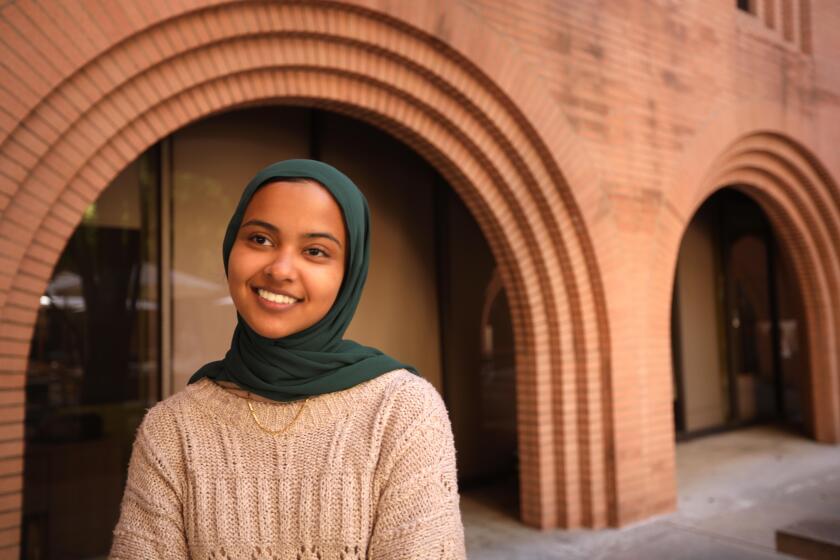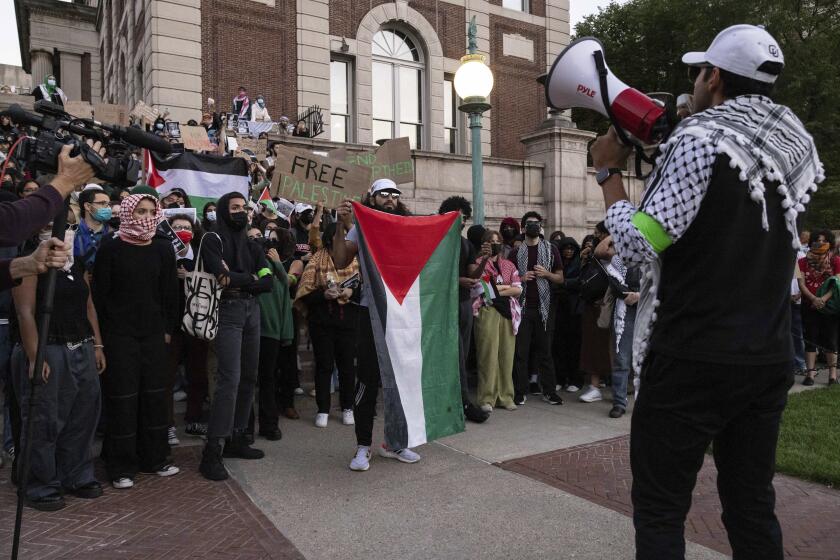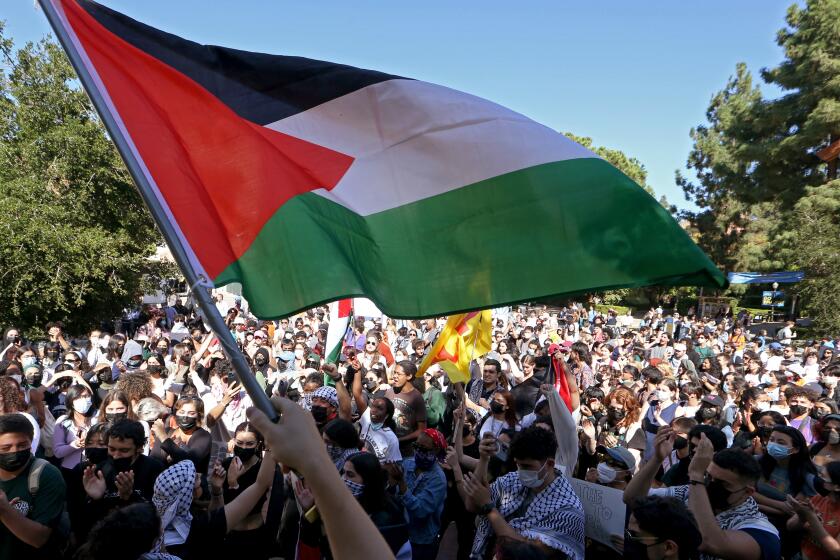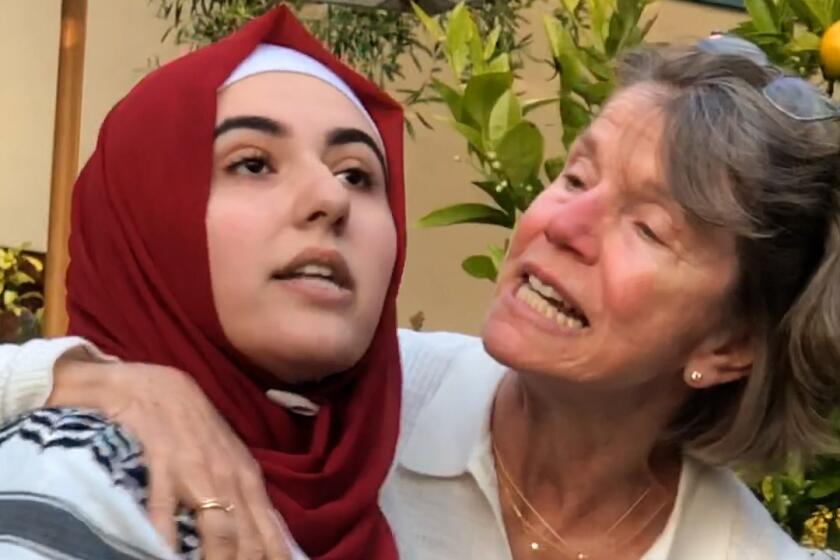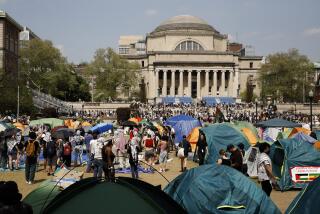Columbia University’s president rebuts claims she has allowed school to become a hotbed of hatred

WASHINGTON — Four months after a contentious congressional hearing led to the resignations of two Ivy League presidents, Columbia University’s president appeared before the same committee on Wednesday and unequivocally denounced antisemitism on her campus, rebutting claims that she has allowed Columbia to become a hotbed of hatred.
“We condemn the antisemitism that is so pervasive today,” Columbia President Nemat Shafik said in an opening statement. “Antisemitism has no place on our campus, and I am personally committed to doing everything I can to confront it directly.”
Shafik was called before the committee to address questions of antisemitism and the school’s response to conflicts on campus over the Israel-Hamas war. She was originally asked to testify at the House Education and Workforce Committee’s hearing in December, but she declined, citing scheduling conflicts.
With the advantage of hindsight, Shafik acknowledged there has been a rise in antisemitism on Columbia’s campus but said it’s far from pervasive, describing instead a campus split mostly over political differences. The “vast majority” of demonstrations have been peaceful, she said, and officials have worked to unite students.
Asna Tabassum was selected as USC valedictorian and offered a slot to speak at graduation. The university canceled her speech after pro-Israel groups criticized her Instagram.
“We brought in extra security expertise and had regular contact with NYPD and the FBI,” she said. “I have spent most of my time since becoming president on these issues, holding over 200 meetings with groups of students, faculty, alumni, donors, parents, some of whom are here, and 20 meetings with other university presidents to learn from each other.”
Her vision clashes with one presented by Republicans in Congress and some Jewish students who say antisemitism has gone unchecked at Columbia. As evidence, they cited a Jewish student who was hit with a stick on campus while putting up posters of Israeli hostages, and protesters who yelled chants that some consider a call for the genocide of Jews.
“We’ve seen far too little, far too late done to counter that and protect students and staff,” said Rep. Virginia Foxx (R-N.C.), chair of the committee. “Columbia stands guilty of gross negligence at best and, at worst, has become a platform for those supporting terrorism and violence against Jewish people.”
Hours before the hearing, students supporting Palestinians protested on Columbia’s campus. Organizers included two groups that Columbia previously suspended for unauthorized protests, Students for Justice in Palestine and Jewish Voice for Peace.
The federal government has opened civil rights investigations at schools over allegations of antisemitism or Islamophobia.
The protest could become fresh fodder for Republicans. It fell outside the hours designated under new rules Columbia adopted in February. At a news conference before Shafik’s testimony, Foxx said there’s “activity going on on the campus this morning that shouldn’t be allowed.”
Foxx and Rep. Elise Stefanik (R-N.Y.) appeared with Jewish students from Columbia who said they have faced threats and physical confrontation. They described a student who had Star of David necklaces torn off while walking to class and taunts from students who say “the Holocaust wasn’t that special.”
Stefanik said Republicans will hold Columbia accountable for failing to protect students.
“Despite claims otherwise, Columbia’s leadership refuses to enforce their own policies and condemn Jewish hatred on campus, creating a breeding ground for antisemitism and a hotbed of support for terrorism from radicalized faculty and students,” she said.
The December hearing featured the presidents of Harvard University, the University of Pennsylvania and MIT, whose lawyerly responses drew fierce backlash and fueled weeks of controversy. The presidents of Penn and Harvard have since resigned.
Faculty members across the University of California system have launched an unprecedented organizing drive to protect campus supporters of Palestinians who have been harassed and threatened, especially since the Israel-Hamas war exploded.
During a heated line of questioning at the December hearing, Stefanik asked the university leaders to answer whether “calling for the genocide of Jews” would violate each university’s code of conduct.
Liz Magill, then president of Penn, and Claudine Gay, then president of Harvard, both said it would depend on the details of the situation. MIT president Sally Kornbluth said that she had not heard any calling for the genocide of Jews on MIT’s campus, and that speech “targeted at individuals, not making public statements,” would be considered harassment.
Almost immediately, the careful responses from the university presidents drew criticism from donors, alumni and politicians. Magill resigned shortly after the hearing. Gay stepped down in January, following an extended campaign that accused her of plagiarism.
Shafik was to testify Wednesday along with Columbia University board members. Tensions and accusations of hate and bias have roiled Columbia as they have at its sibling colleges, but Shafik had the benefit of hindsight in preparing her remarks. In an op-ed published in the Wall Street Journal on Tuesday, she emphasized the delicate balance between protecting free speech and fostering a safe environment for students on campus.
UC Berkeley professor Erwin Chemerinsky and his wife, professor Catherine Fisk, got into a heated argument with a pro-Palestinian protester during a dinner at their home.
“Calling for the genocide of a people — whether they are Israelis or Palestinians, Jews, Muslims or anyone else — has no place in a university community,” Shafik wrote. “Such words are outside the bounds of legitimate debate and unimaginably harmful.”
Since the Oct. 7 Hamas attack on Israel, tensions have run high on university campuses. Jewish students have said that their schools are not doing enough to address instances of antisemitism. Meanwhile, students who have organized in support of Palestinian rights say they have been disproportionately targeted and censored by campus administrations.
Columbia, along with many other colleges and school districts, is the subject of a series of Department of Education investigations into antisemitism and Islamophobia on campuses. It also has been targeted by lawsuits from both sides. The New York Civil Liberties Union sued over whether the university singled out two pro-Palestinian student organizations when it suspended them from campus over protests in the fall. Groups of Jewish students have also filed suit, saying antisemitism on campus violates their civil rights.
Ma and Binkley write for the Associated Press. Binkley reported from Los Angeles.
More to Read
Sign up for Essential California
The most important California stories and recommendations in your inbox every morning.
You may occasionally receive promotional content from the Los Angeles Times.
